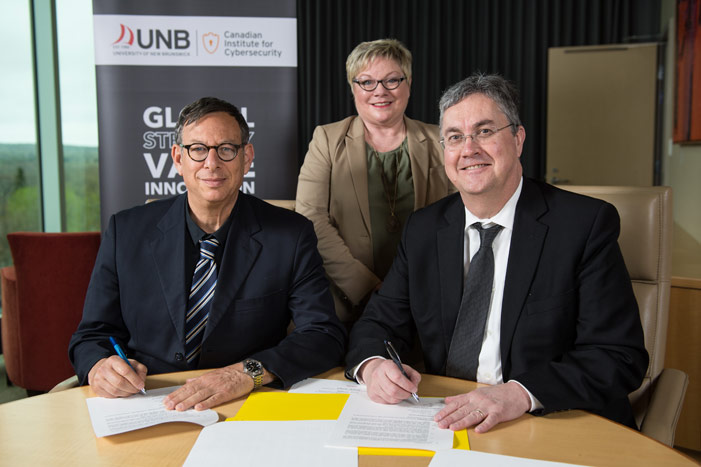UNB forges partnership with Israeli cybersecurity initiative marking a first
Author: Communications
Posted on May 15, 2017
Category: UNB Fredericton

The University of New Brunswick is forging a formal partnership with a major Israeli cybersecurity initiative to spur greater innovation, economic development and collaboration in the field of cyber research.
UNB is the first Canadian university to sign a collaboration agreement with CyberSpark, Israel's cyber innovation arena – a move both sides herald as a path to greater advancement and economic opportunity in cybersecurity.
Israel has emerged as a global leader in developing cybersecurity solutions and companies. With exports totaling $6 billion, or approximately 10 per cent of the worldwide market in 2016, and 22 per cent of private investment, Israel is home to more than 430 cybersecurity companies and 40 research and development centres of foreign multinationals including Canadian companies.
“UNB has been fostering industry collaboration, research and innovation in the area of cybersecurity for more than 15 years,” says UNB President Dr. Eddy Campbell. “It’s a great honour, and a great testament to our determined work in this sector, to be the first Canadian university to partner with CyberSpark. We’re very much looking forward to advancing and increasing our industry-focused research and development activities.”
Dr. Campbell and Roni Zehavi, CEO of CyberSpark, signed a memorandum of understanding formalizing the research partnership at a ceremony today at the university’s Fredericton campus.
“There is a good match in DNA between UNB and CyberSpark,” says Mr. Zehavi. ”In both places, there is a working ecosystem combining a top-notch university with highly advanced research and industry collaboration.”
CyberSpark was launched in Beersheba, Israel, in 2014 by Israeli Prime Minister Benjamin Netanyahu with the goal of bringing together local companies, global multinationals, all levels of government, the military and academia. Companies that locate in Beersheba receive grants as a proportion of salaries paid to workers and companies that keep intellectual property in Israel receive additional compensations.
Mr. Zehavi says the model has been a success and CyberSpark has become a lightning rod for attracting foreign multinationals and other research collaborators.
The partnership is expected to create greater innovation and economic opportunities for New Brunswick.
“The training of highly qualified people as well as job and company creation with another country has the potential to grow the province’s economy,” says Dr. Ali Ghorbani, director of the Canadian Institute of Cybersecurity at UNB and the university’s dean of computer science.
Mr. Zehavi says CyberSpark quickly became interested in UNB’s cybersecurity research after a visit to the university last year.
“Under the leadership of Ali Ghorbani,” he says, “we found a highly responsive, fast moving and enthusiastic team that resonates well with CyberSpark.”
Media contact: Claire Geldart
